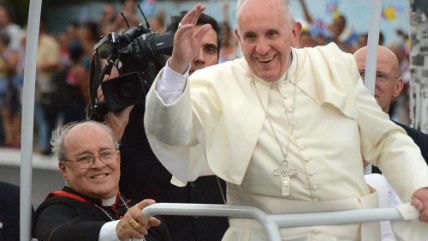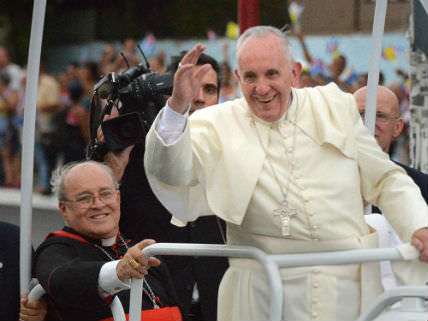Pope Francis Helps Normalize Security & Police State in the U.S.
Largest security operation in U.S. history unlikely to hold that record for too long.


More than 800,000 pilgrims flocked to the Benjamin Franklin Parkway yesterday to watch Pope Francis celebrate Mass in front of the Philadelphia Museum of Art (the "Rocky" museum). They poured into security checkpoints that took hours to get through. They were prohibited from bringing in things like ammunition, explosives, firearms, and selfie sticks but also things like apples and other hard fruit, because of the potential for those things to be used as projectiles.
None of the pilgrims going through the checkpoints had any chance of being anywhere close enough to the pope to chuck an apple or a battery or anything else at him. Better safe than sorry, right? On MSNBC over the weekend, Chris Matthews gushed over how much "style" the Vatican's own security detail had. He told the story of being able to see Bill Clinton walking through Lafayette Park (across the street from the White House) and how you used to be able to walk into Capitol Hill to see your Congressman, before "everything changed."
That security deserves higher prioritization today than it did before 9/11 is a widely held belief that goes without scrutiny in some circles, including much of mainstream media. The pope's visit to the United States could've been a powerful moment to challenge that orthodoxy. A man who puts his life into God's hands could spurn the Secret Service's. A pope who calls Christian gunmakers "hypocrites" could pump the brakes one driver of demand for firearms—the ever expanding theater of U.S. security services. Instead, the papal visit produced the largest security operation in U.S. history. Pilgrims got to test their faith not just with the journey to Philadelphia, but the journey through the checkpoint too.
My wife and I, who have been living in Philly for the last year and a half, drove down to West Philly yesterday to try to walk over to see the papal Mass. A national guard at one of the security checkpoints pointed to a man holding a Chinese flag about halfway between where we were and where the security check started. It had taken him an hour to get there, the guard said, so we went to a local restaurant to watch the Jets fail to get the Eagles to 0-3. The first one was closing because business had been so quiet. The second was open and we were the only patrons there the entire time. The bicyclists had a blast—many normally ride through the streets like there are no cars, but this time there actually weren't. The streets were closed to vehicles for miles around where the Mass was being held.
Philadelphia's city government got a lot of heat for scaring away potential tourists this weekend with their obsession for security. The city changed tacks earlier this summer, launching campaigns to encourage Philly residents and businesses to stick around for the papal visit. It was probably too little, too late. While some businesses expected a busy weekend—especially since the city government had noted the economic boon the papal visit would be—and stocked up accordingly, businesses that stayed open saw significant drops in sales this weekend. Pilgirms, apparently, came to Philly to see the pope not eat a cheesesteak. The street vendors selling Pope Francis- and Vatican-branded merchandise told me their sales were good and that the local police and other security agencies on the ground were leaving them alone. Even pilgrims want a souvenir to commemorate their trips.
The economic costs of the papal visit to Philadelphia—estimated by some to be equal to the losses incurred during Hurricane Sandy—will be what's debated among Philly residents and what local politicians will be punished for if it gets that far with voters. It may not. Mayor Michael Nutter leaves office this year, and the election in November is expected to be a walk for the Democratic candidate in the majority Democrat city.
But no one will be punished electorally for allowing Philadelphia to be the ground zero for the largest security theater performance in U.S. history because, as Chris Matthews and so many other media personalities said this weekend, "everything changed," Except it hasn't. Abraham Lincoln's assassination changed the course of U.S. history but didn't lead to the creation of a security bubble around the presidency. Neither did Chester Arthur James Garfield* getting offed by someone looking for patronage, nor William McKinley's assassination by a foreign-born anarchist "terrorist."
The assassination attempt against Pope John Paul II in 1981 didn't lead the pope to demand a tighter security bubble on future public trips. Instead he asked for people to pray for his would-be assassin. He met the man's mother and sibling and even visited him in jail. In 2000 the pope asked the president of Italy to pardon the man who tried to kill him. To his credit, like John Paull II, Francis has eschewed a bulletproof popemobile. But he should be eschewing the larger security bubble that feeds a culture of fear, and the violence that breeds, as well.
Terrorists, anarchist, Islamist or otherwise, can only kill people and destroy property. They can't change social and political norms. Only reactions to terrorism can do that. And they have been doing that. The pope, Philadelphia, the feds, the mainstream media, all of "us," failed to take the opportunity of the papal visit to reverse that trend, instead contributing to the further normalization of the all-encompassing security state.
*Never forget.


Show Comments (181)